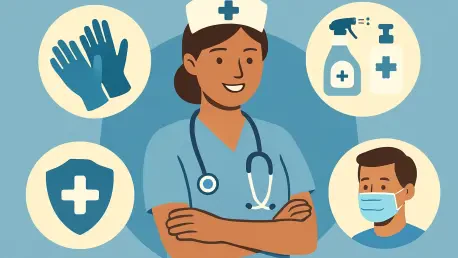In an era where healthcare settings are increasingly becoming battlegrounds for disruptive and violent incidents, a pressing need to protect both workers and patients has emerged as a critical priority across the nation. United Health Services (UHS), a prominent healthcare system based in New York State, has taken a bold stand by spearheading a transformative campaign known as the Respect and Heal Initiative. This collaborative effort seeks to foster environments of mutual respect and healing within hospitals and clinics, addressing the alarming rise in harassment and threats faced by frontline staff. By uniting with other healthcare organizations, law enforcement, and public policy experts, UHS is paving the way for systemic change. The urgency of this mission cannot be overstated, as the safety of those who dedicate their lives to caring for others hangs in the balance, making this initiative a beacon of hope for safer medical spaces.
Building a Safer Healthcare Environment
Collaborative Strategies for Change
The Respect and Heal Initiative stands out as a powerful alliance designed to combat the growing issue of violence in healthcare settings through a united front. UHS, alongside other New York State hospitals, has committed to a zero-tolerance policy for threats and disruptive behavior, ensuring that safety remains paramount. This collaborative approach emphasizes the importance of shared commitments, such as promoting respectful interactions and enforcing strict consequences for violations. Beyond policies, the initiative encourages the formation of internal committees across institutions to exchange best practices and develop innovative solutions. Training programs focused on de-escalation techniques and conflict management are also a cornerstone of this effort, equipping staff with the tools to handle challenging situations effectively. By fostering such cross-institutional partnerships, UHS ensures that even smaller organizations have access to resources and ideas that can enhance safety protocols, creating a ripple effect of positive change throughout the healthcare community.
Strengthening Community Ties
A key element of UHS’s involvement in the Respect and Heal Initiative is its dedication to building strong community partnerships to bolster safety. Recognizing that no single entity can tackle these challenges alone, UHS has actively engaged with local law enforcement and public officials to create a cohesive strategy. A notable example of this collaboration was a press conference hosted by UHS, where leaders like Broome County District Attorney F. Paul Battisti joined forces with state and local representatives to underscore a shared commitment to accountability. This event highlighted the critical role of external allies in reinforcing safety measures within healthcare facilities. Additionally, UHS has prioritized transparency by openly sharing its goals and progress with the public, fostering trust and encouraging community support. These efforts demonstrate how integrating diverse perspectives—from legal authorities to healthcare providers—can amplify the impact of safety initiatives, ensuring a more secure environment for everyone involved.
Implementing Robust Safety Measures
Enhancing Security Protocols
UHS has taken decisive steps to prioritize the well-being of its staff and patients by implementing rigorous safety protocols as part of the Respect and Heal Initiative. Security screenings and structured check-in processes for visitors and patients are now standard practice at UHS facilities, designed to mitigate risks before they escalate. These measures are complemented by comprehensive safety standards that address potential vulnerabilities in clinical settings. Leadership at UHS, including President and CEO John M. Carrigg and Vice President of Nursing Peggy Thomas, has publicly affirmed the organization’s unwavering commitment to maintaining hospitals as sanctuaries of care. Their statements emphasize that such environments must be rooted in respect and healing, free from fear or intimidation. By setting a high benchmark for safety, UHS not only protects its own community but also serves as a model for other healthcare systems striving to address similar challenges, proving that proactive measures can yield significant improvements.
Addressing Nationwide Challenges
The alarming trend of violence in healthcare settings is not unique to New York State, as it reflects a nationwide crisis that demands urgent attention. Through the Respect and Heal Initiative, UHS is contributing to a broader movement to standardize safety practices and share effective strategies across the country. This collaborative effort acknowledges that systemic change requires collective action, with hospitals of varying sizes and resources working together to protect their workforce. The initiative’s focus on training and policy development aims to create a unified framework that can be adapted to diverse environments, ensuring consistency in how threats are managed. Moreover, the emphasis on accountability ensures that violations are met with appropriate consequences, deterring future incidents. UHS’s role in this movement highlights the importance of leadership in driving change, as the organization continues to advocate for policies that safeguard the vital healthcare workforce from harm while maintaining the integrity of patient care.
Reflecting on a Path Forward
Looking back, UHS’s leadership in the Respect and Heal Initiative marked a pivotal moment in the fight against violence in healthcare settings. The collaboration with other New York State hospitals, law enforcement, and community stakeholders established a strong foundation for systemic improvement. As these efforts unfolded, the implementation of stringent security protocols and shared training programs demonstrated a tangible impact on fostering safer environments. Moving forward, the focus should shift toward sustaining this momentum by expanding the reach of the initiative to more regions and institutions. Encouraging ongoing dialogue among healthcare leaders and policymakers will be essential to refine strategies and address emerging challenges. Additionally, investing in technology and resources to support safety measures can further strengthen these efforts. UHS’s journey showcased a blueprint for change, and the next steps lie in scaling these solutions to ensure that every healthcare facility becomes a true haven of healing and respect for all.









